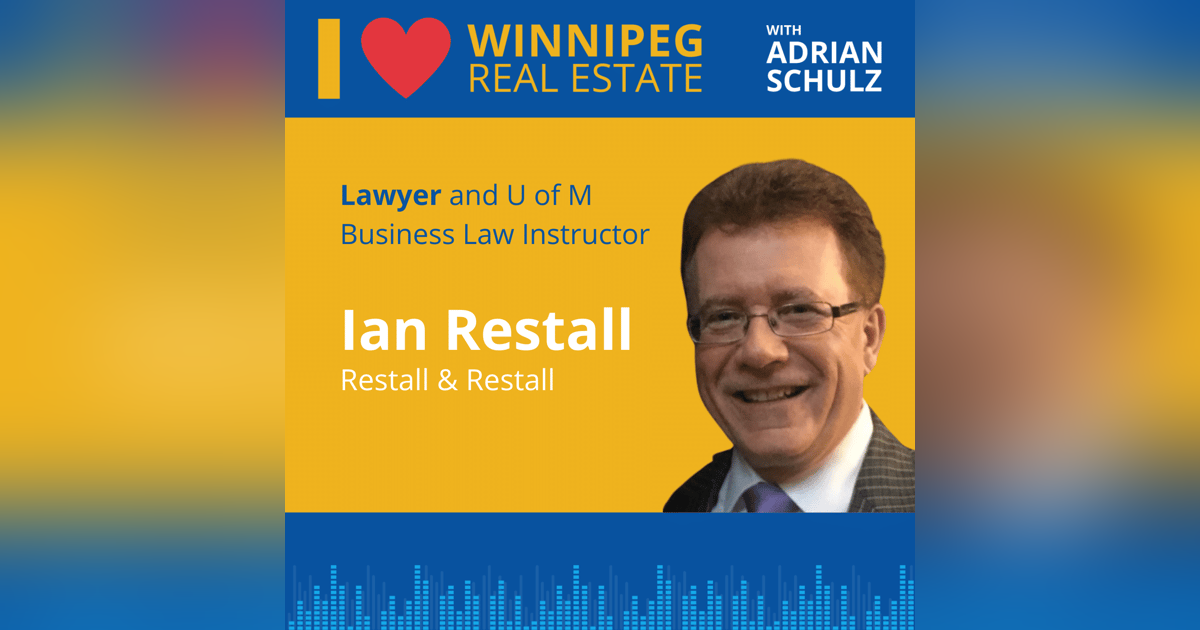Ian Restall on choosing a real estate lawyer, closing costs, and holding companies


Ian Restall is a lawyer with one of Winnipeg’s oldest law firms, Restall & Restall and a University of Manitoba Business Law Instructor. In this episode we talk about choosing a lawyer, closing costs, and other things to consider when purchasing real est...
Ian Restall is a lawyer with one of Winnipeg’s oldest law firms, Restall & Restall and a University of Manitoba Business Law Instructor. In this episode we talk about choosing a lawyer, closing costs, and other things to consider when purchasing real estate.
Adrian:
I'm joined today by Ian Restall, who is a lawyer at Restall & Restall on Broadway in Winnipeg. Welcome, Ian.
Ian:
Good afternoon, Adrian. How are you today?
Adrian:
I couldn't be better to have such an esteemed guest as yourself. Now, if I recall, not only are you a lawyer, but you are also a long-time instructor at the University of Manitoba, is that right?
Ian:
Yes, that's correct. I've lectured at the university for over 30 years now, as well as conducting my practice.
Adrian:
And Ian, could you tell us a little bit about the scope of your legal practice?
Ian:
Well, in terms of the areas in which I practice, I'm what would be commonly referred to as a solicitor. So I do non court work. I would be involved in commercial transactions, real estate transactions, wills and estates, negotiated family settlements and employment law, as well as general contractual matters.
Adrian:
When choosing a lawyer that specializes in real estate transactions, what should a person look out for?
Ian:
That's a bit of a difficult question. I think sometimes people treat the legal profession differently from other occupations, and that can be a mistake. I think that when I'm seeking a professional, I always seek referrals. I talk to people who have been involved in transactions and find out what their experience is like and then get a quality referral to a professional. And I think that would be the manner in which I would look for a real estate lawyer.
Adrian:
Aside from the cost of the actual property being purchased, what other costs should someone budget for when buying a home or rental property?
Ian:
There are a series of costs, but what has become the largest cost, frankly in most transactions is the transfer tax. And it's substantial now, on a $200,000 home, it's $1,650, $300,000 home is $3,650. And then at 400,000, which these days is becoming not an expensive home in the marketplace, it's $5,650. So that's a huge expense. In addition, of course, the other out-of-pocket expenses would include such things as title insurance searches, registration costs. And then there are some miscellaneous costs like courier services.
Adrian:
Is there average an budget amount or a formula that people should use when calculating or budgeting for the additional costs?
Ian:
To some extent, it depends on the value of the home because as the home becomes more expensive transfer tax, both in an absolute and percentage amount increases. So at the lower level of prices, perhaps a percent and a half or 2% would be adequate. When a home is more expensive, that might be somewhat less than adequate. And you might have to have two and a half or 3%. I would add quickly if you're looking at a revenue property or commercial property, the city searches can be quite expensive as well. The centralized search is over $500 at this point. And there are several other searches you might want to undertake for revenue and commercial properties.
Adrian:
In speaking about land transfer tax, is that a city provincial or federal fee?
Ian:
That's an excellent question, Adrian, because those of us who were in the trade, we forget that when you're approaching a transaction; you don't know all the intricate details. That is a provincial tax attached to really the registration of a transfer of land at land titles.
Adrian:
Now, do you happen to know if this exists in all Canadian provinces or is it a Manitoba thing?
Ian:
No, I think it exists in most Canadian provinces with which I'm familiar, but the levels vary. I understand in Alberta, for example, it's much lower, though that might change with the price of oil and in other jurisdictions it would rival Manitoba's.
Adrian:
Perhaps a unicorn question, but one wonders. Is there a way to avoid paying land transfer tax on perhaps a transaction such as a rental property.
Ian:
Typically, it's difficult to avoid. We've seen it not paved, and maybe that's a better word than avoid, but sometimes it's not necessarily paid on share purchase transactions if a company owns property and then the shares of the company are sold to a new purchaser, but we have to look at those things on a case-by-case basis.
Adrian:
Are you a proponent of holding rental properties in a real estate holding company versus holding them in your personal name?
Ian:
I am mainly because I'm always concerned about potential liability. And so consequently, I like the added protection and creditor proofing that a holding company offers.
Adrian:
Is it a major expense or obstacle to hold rental properties in a real estate holding company?
Ian:
I don't think it's a major expense. What might be required are the annual filings of the corporation and perhaps another tax return, but it's not prohibitive, especially if you have a fairly large or you anticipate having a larger portfolio of properties. In my own life, I will not become involved in a transaction or own property without having a corporation involved.
Adrian:
Fair enough. And that's from a legal perspective, definitely on a borrowing perspective, it's slightly different because obtaining financing for real estate using a corporation can be, and in most cases is more difficult than holding that debt personally.
Ian:
Do you find in your practice, Adrian... I don't mean to ask you questions, but do you find that if you have a strong personal covenant, that will avoid the reticence that some lenders have with respect to corporations?
Adrian:
Most definitely. There are numerous Canadian lenders, specifically monoline lenders, which are institutions that specialize in mortgages versus the full suite of financial offering, such as banks. And some of those mono-line lenders do permit corporations to be on the mortgage, but you are correct personal covenants and the personal borrower strength plays a key role in being able to, if at all a mortgage in a corporation's name.
Ian:
Yeah, that's actually been my experience as well.
Adrian:
I would even argue that the local credit unions are quite good, in fact, at doing such mortgages with company or specifically real estate holding company names. I know personally, as you probably know, I hold my real estate in personal name. However, that is for a variety of different reasons and factors. But I do understand the benefits and potentially the detractors of holding real estate in a holding company. What is the most common mistake that you see clients making when buying real estate, either a primary residence or second home or a rental property? Is there any commonality in mistakes that get made?
Ian:
Well, there are different mistakes, but some of them are fairly common. One of the things that people don't consider carefully, especially when two or more individuals are purchasing a property, is whether to own it jointly or as tenants in common. The difference is, if you own it jointly, there's an automatic right of survivorship with the other owners of the property. This might not be something you want, especially it's a property for commercial purposes, where you have fellow owners who aren't necessarily the individuals who you wish to have the property succeed to upon your death. So this is often not considered, and even couples who are purchasing homes sometimes want the property in joint ownership, which of course historically avoided probate fees should one of them die.
Ian:
But of course, probate fees have been eliminated in Manitoba last November. And so, consequently, that's not a concern. The other issue of course is if you have a couple and they're both active in business, or one of them is active in business, and one is not, you might want the member of the couple, the spouse who is in a business that might create liability, not on the title because if a catastrophe occurs and liability ensues, the joint owners are both liable to creditors or the trustee in bankruptcy and half the house could be lost. So what we seek to do and what we consider at our firm is when we're interviewing purchasers, what is your occupation and what are the risks of liability? And if there's a substantial risk for when one party to incur a huge liability, we would counsel them to put the property in the partner's name who has less exposure to commercial and other liabilities.
Adrian:
To clarify that a little bit further. So if one is married or perhaps in a common law relationship, one of the two parties could be on title alone versus both?
Ian:
Correct.
Adrian:
And are there any, I guess, risks associated with that to the party who is not on title?
Ian:
The only potential risk is if the union dissolves, you've got one party on title and perhaps the other party not, but has covenant under the mortgage and this can create some difficulties. So that's a good insight. You maybe want to take stock of the quality of your relationship before buying property generally.
Adrian:
It sounds like at some time you'd become a relationship advisor in addition to providing legal counsel.
Ian:
Well, I'm not sure advisor's the right word, but we can provide historic insights into the potential liabilities of any situation, including relationships. I should hasten to point out that our advice in this regard is not always followed.
Adrian:
Ian, how do people reach you?
Ian:
Well, I'm easy to get a hold of, but I'm an old-fashioned guy. So I like to speak to people on the phone. My phone number is 925-2525.
Adrian:
Excellent. Well, thank you so much, Ian, for being with us today on this episode of, I Love Winnipeg Real Estate. And before we finish off, can you perhaps tell us, what do you love about Winnipeg real estate?
Ian:
There's so much to love. There's the diversity of homes and structures, there's the stability of the market yet increasing over time. And I think it's just a very solid alternate investment to the financial instruments that are perhaps often proffered as alternatives.
Adrian:
Ian, thank you so much for being a guest on today's episode.
Ian:
Thank you for having me, Adrian.
Adrian:
That was Ian Restall, lawyer with law firm, Restall & Restall on Broadway in Winnipeg. We'll chat again soon. Bye-bye.

Lawyer and U of M Business Law Instructor






